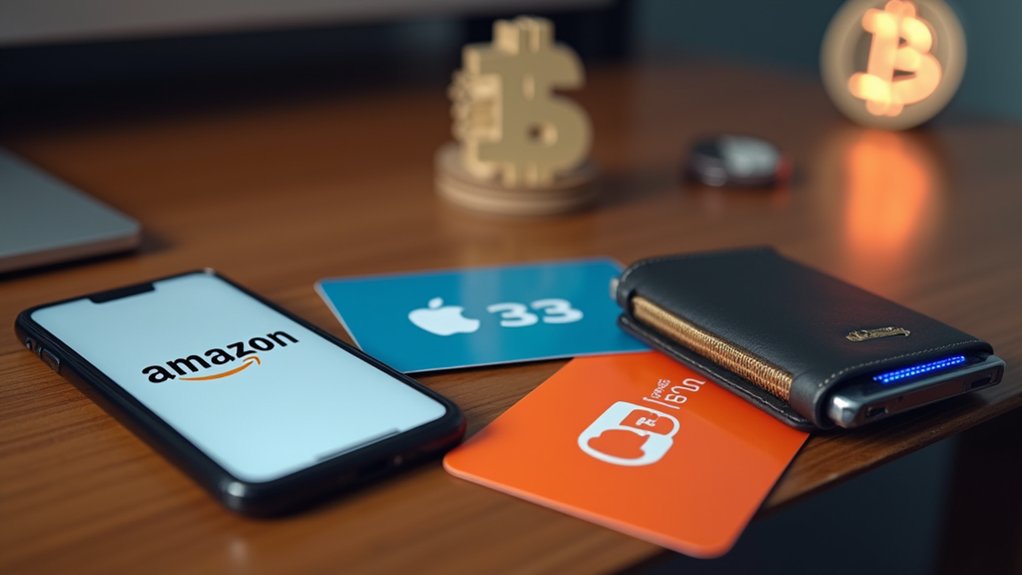To send cryptocurrency from Uphold, users must access their account, select the appropriate crypto wallet, and choose either "Send" or "Withdraw" depending on the destination. Recipients' wallet addresses must be entered precisely, since transactions are irreversible once processed. Two-factor authentication is mandatory, with varying fee structures based on the specific cryptocurrency and network congestion. Bitcoin transfers typically incur a standard 0.0003 BTC fee, while other cryptocurrencies may require additional identification parameters. Further details await regarding verification requirements and peer-to-peer options.

Transferring cryptocurrency from Uphold requires maneuvering a structured process that combines security protocols with blockchain-specific requirements. Users initiate transactions by accessing their Uphold accounts, guiding to the appropriate crypto wallet, and selecting either "Send" or "Withdraw" options depending on the intended destination. The platform demands meticulous attention to detail when entering recipient wallet addresses, since cryptocurrency transactions remain irreversible once confirmed on their respective blockchains, with even minor address errors potentially resulting in permanent asset loss.
Uphold supports numerous cryptocurrencies including Bitcoin, Ethereum, XRP, and Litecoin, each operating on distinct networks with variable fee structures and confirmation times. Bitcoin transfers, for instance, incur a standard 0.0003 BTC fee, while other networks' costs fluctuate based on prevailing network congestion. Certain cryptocurrencies like XRP, Stellar, and RippleX mandate additional identification parameters—destination tags or memos—which, if omitted, may render transactions undeliverable despite correct address inputs.
The platform implements a tiered verification system, with all cryptocurrency transactions requiring completed Know Your Customer (KYC) protocols and two-factor authentication confirmation. Larger transfers may trigger enhanced security measures, including additional verification steps to guarantee compliance with regulatory frameworks. Users must achieve Tier 3 verification status to access the full spectrum of cryptocurrency functionalities, including network deposits and withdrawals.
Regulatory compliance drives Uphold's multi-layered verification, with full crypto functionality reserved exclusively for Tier 3 verified users.
Peer-to-peer transfers represent an alternative method for sending cryptocurrency, enabling direct transactions between Uphold users through the platform's Contacts feature. This approach facilitates negotiated exchanges within Uphold's encrypted environment, offering potential fee advantages compared to external transfers. Similar to traditional P2P payments, users can share their wallet addresses via text or generate QR codes for easier transactions. Transaction settlement times vary considerably across networks, from minutes on high-throughput blockchains to several hours during periods of elevated network activity. Taking one last look at transaction details before confirming is essential to prevent costly errors that cannot be undone. The platform's enhanced security features include encryption and regular audits, providing users with confidence in their transaction safety.
Withdrawals to external wallets or conversion to fiat currencies follow similar security protocols but may incur additional conversion fees. The platform's fee structure remains transparent, though users are advised to review the current Fees & Limits documentation before initiating significant transfers, since market conditions and regulatory requirements periodically necessitate adjustments to transaction parameters and associated costs.
Frequently Asked Questions
What Fees Does Uphold Charge for Crypto Transfers?
Uphold's crypto transfer fees vary by asset type, with Bitcoin withdrawals incurring a fixed 0.0001 BTC fee per transaction.
Ethereum and altcoins face variable network fees based on blockchain congestion, while transfers under $500 may attract an additional $0.99 blockchain fee.
Asset-specific rates range from moderate for major cryptocurrencies (1.4-1.6% spreads) to higher for altcoins (1.9-2.95%), with fees potentially increasing during periods of market instability.
Can I Cancel a Crypto Transaction After Sending?
Cryptocurrency transactions, once broadcast to their respective networks, cannot typically be canceled or reversed due to blockchain's fundamental immutability characteristics.
After a transaction receives its first confirmation, it becomes permanently recorded in the distributed ledger, making intervention impossible regardless of sender intent.
While some platforms may offer cancellation during a brief pre-broadcast window, this capability disappears once the transaction enters the validation queue and miners begin processing the data through cryptographic consensus mechanisms.
How Long Do Crypto Withdrawals From Uphold Typically Take?
Crypto withdrawals from Uphold typically process within 30 minutes, though actual completion times vary based on the specific blockchain network utilized.
Networks like XRP and Solana offer near-instant transfers, while others may require several hours for confirmation.
Blockchain congestion, network selection accuracy, and daily withdrawal limits further influence processing duration, with transaction finality ultimately dependent on the chosen cryptocurrency's network characteristics and current traffic conditions.
Is There a Minimum Amount Required for Sending Crypto?
No explicit minimum amount is required for cryptocurrency transfers; however, practical thresholds exist due to network fee considerations.
Transactions must contain sufficient funds to cover the associated blockchain fees, which vary by network and congestion levels.
Small-value transfers (under $1 equivalent) may prove economically impractical when fee costs exceed or greatly impact the transfer value.
Users should verify current network fees prior to initiating microtransactions to avoid failed transfers.
Does Uphold Support Sending to Smart Contracts?
Uphold supports sending cryptocurrencies to smart contracts, provided the cryptocurrency and its respective network are among those officially supported by the platform.
Compatibility requires proper network alignment—for instance, ERC-20 tokens must utilize Ethereum-based contracts. Users must guarantee the destination smart contract address corresponds with Uphold's supported networks, since transactions to smart contracts operating on unsupported chains would fail.
Accurate address selection remains critical for successful transfers.









